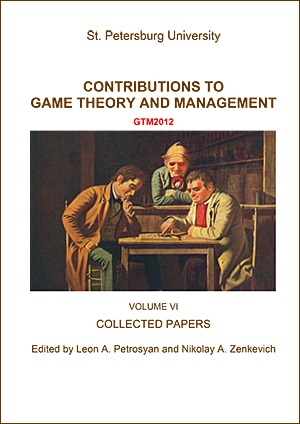Coalitional Model of Decision-Making over the Set of Projects with Different Preferences of Players
Abstract
Let be N the set of players and M the set of projects. The coalitional model of decision-making over the set of projects is formalized as family of games with different fixed coalitional partitions for each project that required the adoption of a positive or negative decision by each of the players. The players' strategies are decisions about each of the project. Players can form coalitions in order to obtain higher income. Thus, for each project a coalitional game is defined. In each coalitional game it is required to find in some sense optimal solution. Solving successively each of the coalitional games, we get the set of optimal n-tuples for all coalitional games. It is required to find a compromise solution for the choice of a project, i. e. it is required to find a compromise coalitional partition. As an optimality principles are accepted generalized PMS-vector (Grigorieva and Mamkina, 2009; Petrosjan and Mamkina, 2006) and its modifications, and compromise solution (Malafeyev, 2001). The proposed paper is the generalization of the paper "Static Model of Decision-making over the Set of Coalitional Partitions" (Grigorieva, 2012) for the case when the preferences of players are different.
Keywords:
coalitional game, PMS-vector, compromise solution
Downloads
References
Grigorieva, X., Mamkina, S. (2009). Solutions of Bimatrix Coalitional Games. Contributions to game and management. Collected papers printed on the Second International Conference “Game Theory and Management" [GTM'2008]/ Edited by Leon A. Petrosjan, Nikolay A. Zenkevich. - SPb.: Graduate School of Management, SpbSU, pp. 147–153.
Petrosjan, L., Mamkina, S. (2006). Dynamic Games with Coalitional Structures. International Game Theory Review, 8(2), 295–307.
Grigorieva, X. (2012). Static Model of Decision-making over the Set of Coalitional Partitions. Contributions to game and management. Collected papers printed on the Second International Conference “Game Theory and Management" [GTM'2011]/ Edited by Leon A. Petrosjan, Nikolay A. Zenkevich. - SPb.: Graduate School of Management, SpbSU, pp. 97–106.
Nash, J. (1951). Non-cooperative Games. Ann. Mathematics, 54, 286–295.
Shapley, L. S. (1953). A Value for n-Person Games. In: Contributions to the Theory of Games( Kuhn, H. W. and A. W. Tucker, eds.), pp. 307–317. Princeton University Press.
Malafeyev, O. A. (2001). Control systems of conflict. - SPb.: St. Petersburg State University.
Downloads
Published
How to Cite
Issue
Section
License
Articles of "Contributions to Game Theory and Management" are open access distributed under the terms of the License Agreement with Saint Petersburg State University, which permits to the authors unrestricted distribution and self-archiving free of charge.




